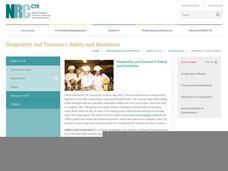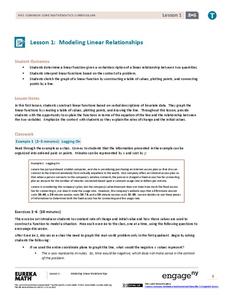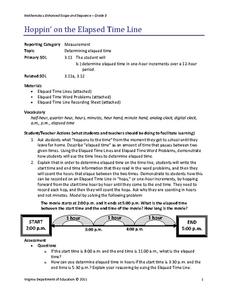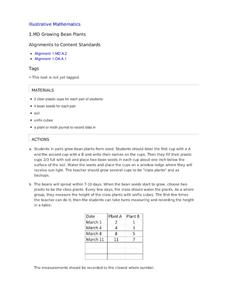EngageNY
The Division Algorithm—Converting Decimal Division into Whole Number Division Using Mental Math
Make math much simpler with mental math methods. The 16th installment in a series of 21 looks at ways scholars can apply mental math to convert division problems into easier problems with the same quotient. Multiplying or dividing both...
Baylor College
Living Things and Their Needs: The Math Link
Enrich your study of living things with these cross-curricular math activities. Following along with the story Tillena Lou's Day in the Sun, learners will practice addition and subtraction, learn how to measure volume and length,...
EngageNY
Grade 5 Math Module 1, Topic A, Lesson 1
Extend the place value system. The first lesson plan in a series of 18 extends the place value system to millions through thousandths. Using place value charts, pupils see how the value of a digit changes as it moves places. Teachers use...
EngageNY
Grade 5 Math Module 1, Topic C, Lesson 8
Go another round on rounding. Pupils refine their learned rounding skills in the eighth installment in an 18-part unit on decimals. The instructional activity takes away some of the previous scaffolding to encourage scholars to use the...
EngageNY
Grade 5 Math Module 1, Topic F, Lesson 15
Remainders don't need to remain a mystery. The 16th of 18 parts in Grade 5 Math Module 1 continues the study of dividing decimals by a whole number. Scholars see how to rename the remainder to a smaller unit, such as when dividing 1.7 or...
Curated OER
Use Google Maps to Teach Math
Capture the engagement of young mathematicians with this upper-elementary math lesson on measuring time and distance. Using Google Maps, students first measure and compare the distance and time it takes to travel between different...
Virginia Department of Education
Modeling Division of Fractions
Provide a meaningful context for learning about the division of fractions with this upper-elementary math lesson plan. Presented with a simple, real-world problem, young mathematicians work in small groups to develop visual...
National Research Center for Career and Technical Education
Hospitality and Tourism 1: Safety and Sanitation
Math and science come alive in this career-related lesson plan on sanitation. Along the way, learners explore bacterial growth rates using exponential notation and graphs. A link to a very brief, but vivid video shows just how quickly...
EngageNY
Modeling Linear Relationships
Math modeling is made easy with the first installment of a 16-part module that teaches pupils to model real-world situations as linear relationships. They create graphs, tables of values, and equations given verbal descriptions.
EngageNY
Grade 5 Math Module 1, Topic A, Lesson 2
What are the place value patterns? An informative lesson plan helps scholars build upon their knowledge of place value to see patterns when multiplying and dividing by powers of 10. Classmates begin the second installment by reviewing...
EngageNY
Grade 5 Math Module 1, Topic A, Lesson 4
Convert with exponents. The fourth lesson in a series of 18 uses powers of 10 to convert within the metric system. Scholars use their fourth grade knowledge of conversions to write and use the conversion factors containing exponents....
EngageNY
Grade 5 Math Module 1, Topic A, Lesson 3
The activity introduces exponents as a way to write powers of 10 and to associate those powers with place value. Pupils practice writing powers of 10 with exponents along with multiplying numbers by powers of 10. The resource is the...
EngageNY
Grade 5 Math Module 1, Topic B, Lesson 5
There is more than one way to write a number. The lesson plan provides teachers with a way to teach reading and writing decimals to thousandths using standard, expanded, and unit forms. Pupils work through in-class and homework...
EngageNY
Grade 5 Math Module 1, Topic B, Lesson 6
Which is bigger? The sixth installment in an 18-part series covering decimals provides a lesson on comparing decimals to the thousandths. Teachers use place value to help class members compare and order decimals. Instruction encourages...
EngageNY
Grade 5 Math Module 1, Topic D, Lesson 9
Introduces addition of decimals by using unit notation to represent the problem. Pupils use a place value chart to decompose the numbers and then add before connecting to the standard algorithm.
EngageNY
Grade 5 Math Module 1, Topic D, Lesson 10
Take a little bit away. The 10th section of an 18-part unit introduces subtraction of decimals. Scholars use a place value chart like they did with addition of decimals to organize and represent the problem. After using the place value...
Virginia Department of Education
Hoppin' on the Elapsed Time Line
Time flies when you're teaching math! Okay, maybe not for everyone, but this lesson will have your young mathematicians calculating elapsed time before you know it.
Virginia Department of Education
Integers: Addition and Subtraction
Young mathematicians construct their own understanding of integers with an inquiry-based math lesson. Using colored chips to represent positive and negative numbers, children model a series of addition and subtraction problems as...
National Research Center for Career and Technical Education
Hospitality and Tourism 2: Costing
The lesson plan provides a richly detailed narrative and sample problems for teaching or reinforcing how to work with percentages. In particular, your audience will compute the costs per serving of food and simulate setting menu prices...
US Mint
Coin Connections
Help young mathematicians make cents out of the US currency system with this two-part math lesson. Children first learn the names and values for each type of coin, before learning to count and compare the values of coins using the...
Illustrative Mathematics
Growing Bean Plants
Plant growth experiments offer rich, cross-curricular learning opportunities that can really excite and engage young learners. In this series, children work in pairs planting, measuring, and comparing the height of bean plants in order...
EngageNY
Grade 5 Math Module 1, Topic E, Lesson 11
Let your understanding of multiplying decimals flourish and multiply. After briefly reviewing place value concepts and how to add and subtract decimals, scholars learn to multiply a decimal fraction (like 0.6) by a whole number. They use...
EngageNY
Grade 5 Math Module 1, Topic E, Lesson 12
Continuing from the previous instructional activity, scholars work on mastering the skill of multiplying decimal fractions by a whole number. The method employed in the instructional activity is to convert the decimal fraction to its...
EngageNY
Grade 5 Math Module 1, Topic F, Lesson 13
After completing a fluency practice set on subtracting, multiplying, and comparing decimals, pupils begin learning about dividing decimals by whole numbers. They see how to use place value reasoning to find compatible numbers for...
Other popular searches
- Math Lessons
- Halloween Math
- Thanksgiving Math
- Applied Math
- Christmas Math
- Math Puzzles
- Consumer Math
- Mathematicians
- Thanksgiving Math Worksheets
- Math Functions
- Mathematics
- Math Measurement























